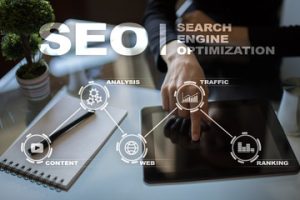SEO is the process of making a website more visible on a search engine results page. The goal is to bring up a site when people are looking for specific information.

This can be accomplished by using keywords naturally in titles, descriptions and urls, as well as optimizing images. Other tactics include creating high-quality, informative content and generating backlinks.
SEO is an effective marketing strategy that can help businesses compete more effectively in their respective industries. It can also reduce the need for costly paid advertising, which can save money in the long run. However, the exact cost of SEO can vary widely depending on the scope and complexity of the services required. This tool can help businesses determine how much to allocate to their SEO budgets, ensuring that they invest wisely in strategies most likely to yield substantial improvements in search engine rankings and web traffic.
The most significant factor in determining the cost of SEO is the level of expertise and effort required. SEO is complex and requires a great deal of technical knowledge to implement properly. In addition, search engines are constantly updating their algorithms and standards, which can impact the effectiveness of SEO campaigns. Therefore, it is important to work with a trusted, experienced agency that can provide ongoing support and guidance.
A comprehensive SEO strategy can include a wide range of services, from keyword analysis to content creation. These efforts can lead to a higher volume of targeted web traffic and more qualified leads. In addition, SEO can increase the credibility of a business by improving its search engine ranking, and it can provide a competitive advantage over competitors that do not optimize their websites.
Despite these advantages, many businesses are reluctant to invest in SEO because it can be expensive. However, a quality SEO campaign can deliver exceptional ROI, often within 12-18 months. This can be a great way to grow your business and get the results you deserve.
When selecting a search engine optimization provider, look for one with a proven track record and industry expertise. Ask for case studies and testimonials to understand the value they can add to your business. It is also important to select a company that offers transparent communication and realistic timelines. Avoid cheap providers that use automated tools and outdated techniques that can trigger penalties and produce zero measurable results. By choosing a reputable and experienced SEO firm, you can rest assured that your investment will pay off.
Attracts Highly Targeted Traffic
In the business world, garnering attention is a key component to success. While physical businesses may rely on architecture or signage to draw in crowds, online marketers can use SEO to drive highly-targeted traffic to their websites and online stores. The organic, sustainable nature of this type of traffic makes it an essential part of any digital marketing strategy.
The goal of SEO is to optimize a website’s content and structure to improve search engine rankings. By identifying the keywords and phrases that are most relevant to your business, you can ensure that your site is visible to users who are searching for what you have to offer. This type of targeted traffic is often more valuable than other forms of digital marketing, as it’s comprised of users who are actively looking for what you have to offer and are more likely to convert into customers.
Choosing the right keywords can be difficult, but using tools like Semrush can help you find terms that are relevant to your product or service and have a high search volume but low competition. You can also filter these results by “search intent,” which indicates what users are searching for when they enter a keyword into the search bar. This information is helpful in determining which words to target because it shows you what types of searches are being performed and can help you craft content that aligns with the needs of your users.
SEO is a complex process that requires consistent implementation, ongoing optimization, and a keen eye for industry trends. Keeping up with the latest best practices and algorithm changes can be challenging, but the rewards are well worth the effort. By implementing a robust SEO strategy, you can grow your business and gain a competitive advantage. In a sea of competing websites, effective SEO is one of the most powerful ways to get your business noticed and drive conversions. Start optimizing your site today to enjoy the benefits of SEO traffic!
Increases Conversion Rates
Search engines use algorithms to determine the relevance of your website’s content. They look at a variety of factors to rank results, such as the amount of time people spend on your page. Search engine optimization focuses on improving internal aspects of your website and Web pages to increase organic visibility. It also includes enhancing external aspects to attract more targeted traffic.
When a person visits your site, they’re looking for the information you provide them with. This can include making a purchase, filling out a form or simply clicking “add to cart.” If you want people to take action on your site, it’s important that you provide them with the best possible experience. This is where conversion rate optimization (CRO) comes in. CRO is a process of testing and tweaking website pages to improve user interactions, which in turn boosts conversions and revenue.
By tracking visitor behavior, you can identify the barriers that prevent visitors from converting. By removing these barriers, you can increase your website’s conversion rate and ROI. For example, a company called Qualicorp noticed that many users were abandoning forms on their website. To fix this, they tested the form and found that removing repeated field names and making profession selection mandatory increased the number of sign-ups by almost 17%.
A well-optimized website increases conversion rates, which in turn increases the return on your marketing investment. For example, a 3% conversion rate can generate significant revenue, even if you don’t drive any additional traffic.
SEO is an integral part of digital marketing and a critical component of any online business. The goal of SEO is to promote a website by increasing its visibility in search engine results pages, which is often achieved through the use of paid advertising campaigns such as pay-per-click (PPC) ads. However, SEO can also be used to improve the user experience and improve overall performance, which can have a positive impact on both search engine rankings and conversions. In addition, by optimizing a website’s conversions, you can increase the effectiveness of paid advertising campaigns.
Increases Revenue
SEO is a great tool for increasing brand visibility, customer confidence, and overall revenue. In addition to reducing customer acquisition costs, SEO helps businesses grow their bottom line by building brand loyalty and encouraging repeat customers. SEO can also help increase sales by targeting keywords that have high purchase intent, resulting in more qualified traffic and higher conversion rates.
Search engine optimization is an integral part of any digital marketing strategy. The goal is to improve a website’s ranking on organic (unpaid) search results pages by optimizing content, HTML tags, and other factors. Search engines use complex algorithms to determine a site’s relevance to specific searches. The process of optimizing a website can take time, but it is worth it in the long run.
A well-executed SEO campaign should include both paid and organic elements to ensure that a business is visible on both paid and unpaid search results pages. Paid search, or PPC, is a type of advertising that involves placing ads on top of SERPs in exchange for a fee each time an ad is clicked. This is usually done through the use of keywords that are relevant to a particular product or service.
Using a combination of SEO and PPC is one of the best ways to maximize ROI on your digital marketing efforts. This is because SEO and PPC work hand-in-hand to bring in targeted visitors that are most likely to convert.
The importance of SEO cannot be emphasized enough. It is the most cost-effective marketing channel available for driving quality, targeted traffic to your site. It is vital for achieving long-term success in the digital marketplace and should be considered an essential component of any growth marketing plan.
By using a targeted approach and focusing on long-tail keywords, you can boost your search engine rankings and drive traffic to your site. However, it takes time to implement and optimize an SEO strategy, so it is important to have a clear understanding of your business’s objectives before starting. By working with a skilled agency you can optimize your site and target audience to achieve the desired results.
